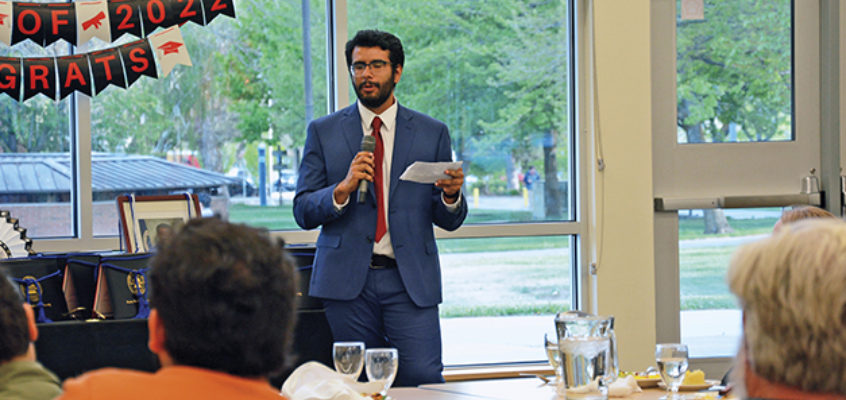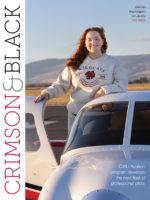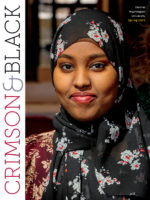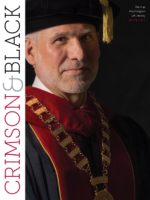
Juan Flores’ daughter, Sophie, loves to tell her friends her dad is a scientist.
Sophie was born the year Flores (’17) started college, at the beginning of a journey that led him to earn degrees in chemistry and biology from CWU and work toward his doctorate in molecular, cellular, and integrative physiology at the University of California, Davis.
As a first-generation college student, Flores knows how much his education means to his daughter. He doesn’t know whether Sophie will follow in his scientific footsteps or if she will go in a completely different direction. Whatever path she chooses, he knows he’s helped point the way.
“Having seen me going through all of this, it’s going to make it seem for her like college is not something out of the expected,” Flores said. “It’s something that’s within reach. It’s something she can do if she wants to do so. And I think that’s my hope—I’m not going to push her to do something specific, but I want her to know that anything is possible for her.”
When a first-generation student like Flores pursues a higher education degree, the experience ripples far beyond their own lives; it impacts their families, their communities back home, the Central community, and the world.
•••••
Becoming a Role Model
When recruiting a first-generation student, you often have to engage with their whole family, said Manuel Rodriguez (’05), Central’s director of Early College Outreach.
As a former recruiter for the CWU College Assistance Migrant Program (CAMP)—who was himself a first-generation student at Central—Rodriguez understands that the families of prospective students may support their children, but they face economic struggles that can make college seem out of reach. He loves it when he runs into a student’s family years later and learns the investment was worthwhile.
“A reward that I’ve gotten to see a lot of times is the kids of the same families that I’ve talked with or spoken with, and these students ultimately end up graduating and are doing well,” Rodriguez said. “They have jobs, and they’re helping themselves and their families.”
In fact, first-generation college graduates often become role models for their entire communities. Younger siblings or cousins may want to follow in their older siblings’ footsteps—like Rodriguez’s younger sister, who also graduated from Central. Sometimes a child pursuing an education can inspire their parents to pursue a GED or college degree, too.
The effects also reach other people in students’ hometowns, especially younger kids.
Dr. Pamela Nevar—director of Central’s McNair Scholars Program, which helps build a path to graduate school for students who are first-generation and low-income or underrepresented in graduate education—has seen this effect in action. Her program is regularly involved in National TRIO Day events that connect current students and high schoolers.
“We get to see the effect of having our students who are juniors and seniors in college conducting original research and getting ready to go to graduate school, talking with high school kids in Upward Bound programs who are getting themselves ready to enter college, and saying, ‘Hey, there’s more for me to do after I finish here,’” Nevar said. “It is important to plant those seeds early about what is possible” and that those opportunities are available to them.

Juan Flores gave the keynote address for the McNair Scholars program’s End of the Year Recognition event last spring.
Strong Support Network
Once a first-generation student arrives on campus, Central staff are dedicated to creating an environment and providing them with the resources they need to have the best experience possible. Programs like CAMP and TRIO Student Support Services (SSS) give them a support system—but they also help young
people build a community with other first-generation students.
These connections help them realize they are not alone, Rodriguez said. “I think an advantage of a student who really connects with others here is to find that comfort, that relational connection with others, that ultimately validates, ‘OK, what I’m doing is worth the sacrifice,’” he said.
Students also can become mentors for each other, noted Dr. Miriam Bocchetti (’06), CWU’s director of grants, who oversees CAMP, SSS, and similar programs. CAMP’s mentoring program pairs first-generation upperclassmen with incoming students.
“When a student meets someone from their same community, maybe their same high school, and they’re like, ‘Hey, I’m going to business school or I have this internship or I’m doing this great thing,’ I think that can really help solidify or confirm a student’s presence and belonging, and the idea that they are here for a purpose,” she said.
First-generation students also share valuable assets with their peers and professors, Bocchetti said. “First-generation” is a broad label, but these students aren’t homogenous. Each arrives with their own story and background.
Her doctoral dissertation examined how first-year Latinx migrant students bring a wealth of knowledge with them to college. For example, they may know multiple languages, understand agriculture, or have deep cultural roots.
People who work with first-generation students should acknowledge and celebrate their assets, she believes. “When they get to college, we use descriptors like ‘vulnerable,’ ‘at-risk,’ ‘marginalized,’ ‘underserved,’ and ‘underrepresented,’” Bocchetti said. “This language implies they are ‘other’ or ‘less than,’ rather than saying, ‘Hey, this student knows their history. They live multi-generationally and know more about where they’re from than we do.’”
Likewise, first-generation students’ cultural knowledge can benefit the larger community. Student-led events like Día de los Muertos, the Martin Luther King Jr. Day of Service, and Cesar Chavez Week reach students from different backgrounds, along with people in the surrounding area.
“Our amazing students really are the ones doing this programming,” Rodriguez said. “It enriches the offerings that we have here on campus. It brings our campus and our students together.
It unites us. And it educates us to learn more about diversity, being more inclusive, and just having an open mind about things we don’t know, but are willing to see them and learn from them.”
••••••
Spreading the Benefits
In May, Flores returned to Central to give the keynote address for the McNair program’s annual End of the Year Recognition event. He enjoyed meeting McNair Scholars who were in the same position he was a few years ago, sharing advice and learning about their plans for graduate school.
He also visited Dr. Alison Scoville, an associate professor of biology and one of the mentors at Central who encouraged him to pursue additional education. Going to graduate school and becoming a professor himself wasn’t even on his radar until Scoville encouraged him to check out the McNair program.
“My mentors opened up this career path that I didn’t even know was possible as a first-generation student,” said Flores, who plans to complete his PhD in 2023.
Once he finishes his advanced degree program, he will begin postgraduate work, funded by a National Institutes of Health fellowship that supports underrepresented students as they build scientific careers.
He hopes to find a tenured position at a research university, start his own lab, and teach neuroscience. With any luck, there will be first-generation students in his classes, allowing him to continue the ripple effect in a new community and new generation.
“I want to be that person for someone else,” Flores said. “I want to be someone that helps them out, encourages them, lets them see what’s possible, and just give back what I got from Central.”






comments powered by Disqus